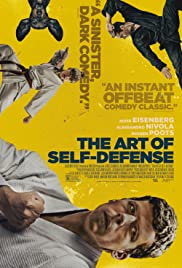
THE ART OF SELF-DEFENSE
US, 2019, 104 minutes, Colour.
Jesse Eisenberg, Alessandro Nivola, Imogene Poots.
Directed by Riley Stearns.
This is a drama about what it means to be male, macho, the elements of being a man in contemporary society. But, the film is full of irony, moments of parody, a critique of ideas and practice of machismo. (Some of the response to the film was very negative because audiences heard it was meant to be comic – but they failed to perceive the inherent ironies funny; others were negative because they saw it as an attack on martial arts.)
Jesse Eisenberg has specialised over the years in portraying nervous, sometimes nerdish characters (even though he did play Lex Luthor in more recent Superman films). Here he is, Casey, a 30 something, working as an accountant, living by himself (except for his favourite pet dog), very awkward in his communication with others. One night he is mugged in the streets and finds himself in hospital, feeling cut off from his work, unwilling to go back to work despite invitations from his boss. He considers buying a gun and goes through the processes of choosing and being interviewed for documentation. But, then he sees the Karate school.
We are introduced to a character, the director of the school, who seems to be a very direct character in his dealings with his students, affirming and challenging. However, as the film progresses, he is the embodiment of the machismo, making further and further demands on his students and, ultimately revealed as an arch controller and manipulator. He is played effectively by Alessandro Nivola. And, he has an enormous impact on Casey, urging him to punch as if he kicked and kick as if he punched.
Complicating the issue is one of the students, female, played by Imogen Poots (who, after this film, co-starred with Jesse Eisenberg in the symbolic Vivarium).
Casey’s experience with the martial arts, straightforward but eventually sinister, transforms him – but into what?
1. The title? The challenge? For devotees of martial arts? For the ordinary audience
2. The American city, Casey’s apartment, the interiors? The offices and workplace? The streets, the dangers? The karate centre, the classrooms, offices, store supplies? Atmosphere and musical score?
3. The film as drama? The film as ironic comedy? Realism, the surreal, the satire?
4. The theme of manliness, male image, characteristics, characters and the touch of the misogynistic? The realism of machismo? The satirical aspects?
5. Casey’s story, Jesse Eisenberg and his screen presence, the touch of the nerd, at home, bachelor, love for his dog, at the office, auditor, the interactions with the men in the discussion about their practical joke, his good relationship with his boss? Timid? Going out the dog food, his being pursued by the cyclists, his being bashed, in hospital, his boss extending leave for him? His return home? Cutting himself off? His boss’s concern and then Casey brushing him off?
6. His decision to get a gun? The discussions with the seller, the seller and all his cautions about children, about guns and dangers, knives? Casey deciding to buy the handgun? The time delay, papers? His changing his mind? Yet the final use of the gun?
7. Walking, seeing the karate centre? Going in, watching Sensei, listening to him, intrigued, the moves, the behaviour of the students? His agreeing to take the initial lesson? Awkward, his presence, weak, yet challenged?
8. Sensei, real name Leslie, his uniform, black belt, conducting the classes, his demands on the students, his philosophy of punching with a kick, kicking with a punch? Self-assurance? His emphasis on the masculine, deriding the feminine? The range of classes, the exercises? Discussions about the night classes? Presence of Anna, and not having a black belt? His interest in Casey, offering him the auditing work? Bespectacled in the office, dominating in the classes? The meticulous rules about the mat, about guns for the weak?
9. Anna, the female present, her conducting the children’s classes, demonstrations, Casey intrigued? Her presence at the promotions? Not being promoted? Asked to move down? Casey thinking that Sensei approved of her? Discovering the truth? Her being humiliated? Her demonstration with the fellow student and her brutal treatment? The dressing room, a back office? The cooling down, her treatment of Casey? The effect on him?
10. The continued classes, the other students, interactions? The student disappointed at his not being promoted, his arm being broken, ousted?
11. Casey, eventually going back to work, Sensei challenging him to be dominant, listening to heavy metal, learning German? His humiliating treatment of the workers? Their accepting it?
12. The yellow belt, his promotion, his pride, his commissioning all the other belts and giving the black belt to Sensei, distributing the other belts? His wanting to wear his yellow belt all the time? Sensei encouraging him?
13. The complexities of Casey’s character, putting on the machismo, yet his sensitivity, especially concerning Anna?
14. The night classes, Sensei and his dominance, the night raids, putting on the helmets, the bikes, the demands on Casey, the accused, outside the bar, drunk, Sensei making Casey attack, brutalise him? Yet throwing it back on Casey that he knew the man was innocent? His travelling with Anna, the confrontation with the policeman, and her being shot in the leg, the brutal bashing? Praise from Sensei?
15. Casey and his realisation that his bashing was a setup, authorised by Sensei who led his team to attack lonely and isolated men, that they would come to the courses?
16. The effect on Casey, the confrontation with Sensei, the challenge to a fight, Casey shooting him? Taking over the class, dominating, the impact on the other students?
17. A heightened drama – with the interspersing of parody to challenge audience ideas about what it is to be male, a man?